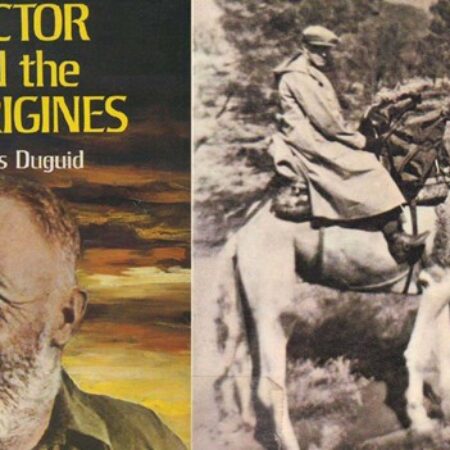
Of his latest article about Scottish missionaries, Paul James-Griffiths of Christian Heritage Edinburgh writes, “This week is about a Scottish Christian who poured out his heart for the plight of the Australian Aborigines, and changed a nation – and died at 102 years old!”
“No money, no hope,” John murmured, as he stooped down to the earth, his face creased with depression and anxiety. Looking up, he added with a dreamlike glint in his eyes, “I need car. I need wine, like the white man.” It was 1982 and I had only become a Christian a few months before. As I hitch-hiked around much of Australia I spent time with Australian Aborigines like John in Alice Springs, Northern Territory. My heart went out to them. As with the North American Indians, the colonial whites had arrived and taken over their country, leaving them caught between two cultures. As a first-year student at university in England I recall vociferously telling my lecturer that I would stand for the human rights of Aboriginal Australians. I never did, but found other desperate needs to be met in my home country. However, a Christian doctor from Scotland became the vibrant voice of the Aborigines; he became their champion for 58 years.
Dr Charles Duguid (1884-1986), a Presbyterian Christian from Saltcoats, Ayrshire, died in Adelaide at the age of 102. The Pitjantjatjara Aborigines loved him so much that they begged for him to be buried near them at the Ernabella Mission Cemetery, which he had pioneered with others in 1937. Tjilpi, they affectionately called him, meaning “respected old man”. Of all the activists for the human rights of the Aboriginal people of Australia, Dr Duguid was the longest and most persistent voice. He had qualified as a medical doctor at Glasgow University and set up his practice as a GP in Adelaide, and as a surgeon at the Memorial Hospital. However, a tragedy amongst the Aboriginal people came to national attention in 1928, sparking off his passion for the human rights of these indigenous people.
A white man was murdered by Aborigines at Brooks Soak in Northern Territory, which ignited the Coniston Massacre of between 31 and 200 native people by the enraged police who enacted a brutal revenge. Dr Duguid travelled there and stayed at the Hermannsburg Lutheran Mission in Alice Springs with the German Pastor, Friedrich Albrecht, where he met the leading Aboriginal artist, Albert Namatjira. As Duguid investigated the situation and met with locals, he became horrified at the terrible treatment of the native people, and his soul was inflamed with a passion to speak up for them to the highest level of government.
From 1928 until his death in 1986, he became Australia’s leading advocate for Aboriginal rights. He seemed to be at the heart of all the key organisations which promoted the rights of the Aborigines: He was a founding member of the South Australian government’s Aborigines Protection Board, following the Aborigines Amendment Act of 1939; he was on the Council for Aboriginal Rights; a member of the Association for the Protection of Native Races, of the Anti-Slavery Society, and of the Aborigines Protection Society. Duguid was appointed by the local government as the inspector of their rights at the Aboriginal reserves, with the responsibility of reporting on any ill-treatment experienced by the native people.
Besides all of this he led a pressure group to grant equality and full citizenship to Aboriginal people, and was the President of the Aboriginal Protection League (1935-1946), as well as being elected as the President of the Federal Council for Aboriginal Advancement (1958), which pulled all of the other organisations together.
Duguid was a dedicated Christian who somehow managed to also find time to support the Australian Student Christian Movement, the Australian Inland Mission, and other mission ministries. You would have thought that all of this hard work would have reduced his lifespan; the opposite occurred when he died at 102 years old – an extraordinary achievement!
“Speak out on behalf of the voiceless, and for the rights of all who are vulnerable. Speak out in order to judge with righteousness and to defend the needy and the poor” (Proverbs 31:8-9, NIV).
